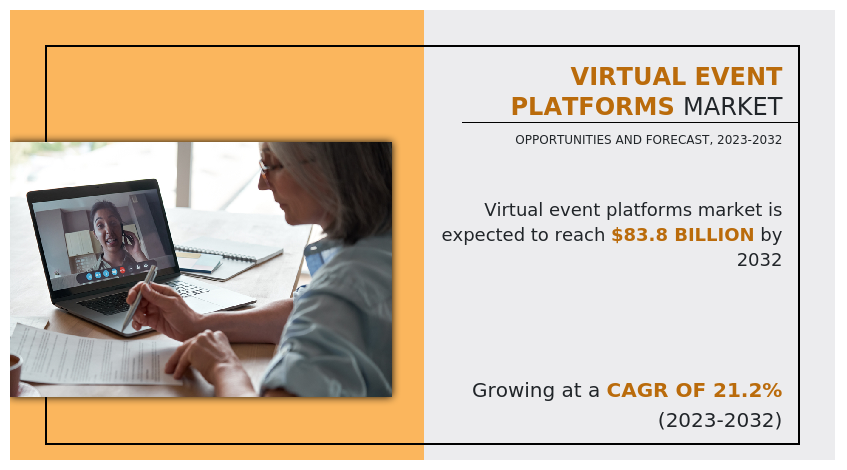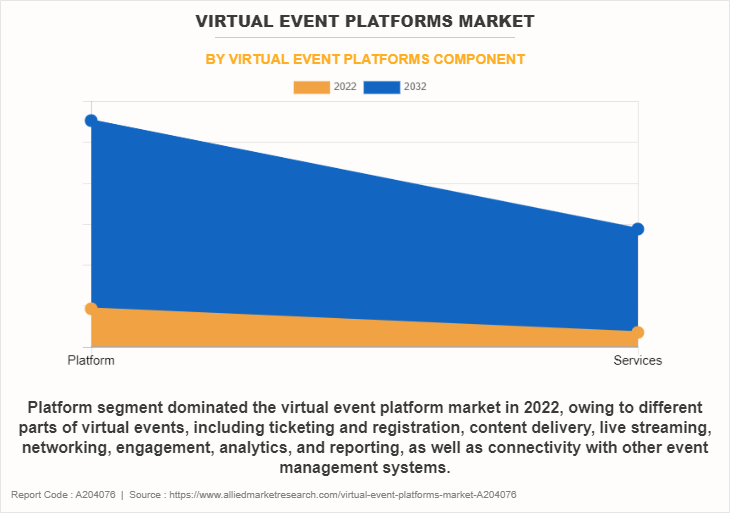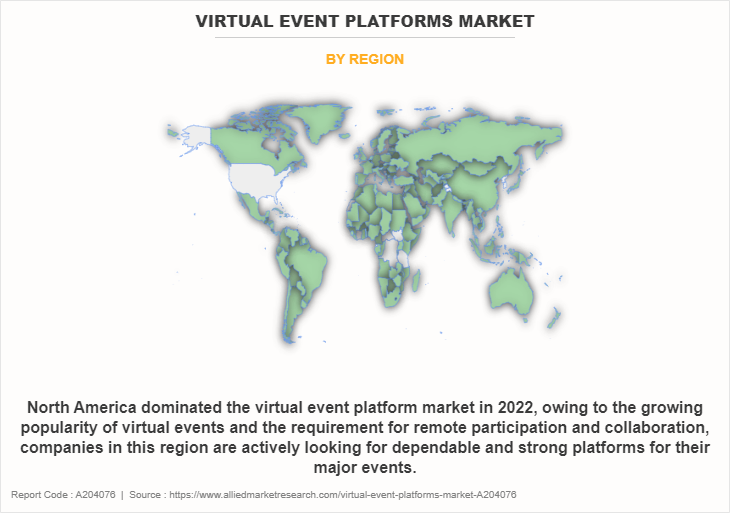Virtual Event Platforms Market Insights, 2032
The global virtual event platforms market was valued at $12.6 billion in 2022, and is projected to reach $83.8 billion by 2032, growing at a CAGR of 21.2% from 2023 to 2032.
Surge in growing acceptance of online streaming and increasing significance of the event management sector primarily drive the growth of the virtual event platform market. However, insufficient technological expertise to integrate virtual event software and lack of infrastructure for communication and inconsistent networks hamper market growth to some extent. Moreover, increasing reliance on CYOD and BYOD solutions is expected to provide lucrative opportunities for virtual event platforms market growth during the forecast period.

The industry that offers software and platforms for hosting and facilitating virtual events, conferences, trade exhibitions, webinars, and other online meetings is known as the virtual event platform market. With the help of these platforms, event planners actually organize and manage virtual events, giving participants a digital venue for distant participation. Additionally, variety of features and capabilities are available on virtual event platforms to simulate the physical event experience in a virtual environment. These features could include interactive sessions, virtual exhibition halls, networking possibilities, live streaming of lectures, and tools for engaging attendees. Moreover, the online event platforms market offer event planners a complete solution for organizing, putting together, and running their virtual events, covering everything from ticketing and registration to content distribution and participant interaction.
Furthermore, multiple industries and businesses are assisted by the virtual event platform industry, including trade exhibitions, corporate events, product launches, educational conferences, and more. It helps in arranging virtual gatherings for personal or commercial purposes, as well as companies of all kinds, from startups to major corporations. Particularly in the past few years, the virtual event platform business has grown and innovated significantly. The COVID-19 pandemic has increased restrictions and made physical events impracticable, which has driving the demand for virtual event. In order to satisfy the changing needs of event organizers and attendees, virtual event platform providers have increased the range of services they offer, added new features, and upgraded the user experience.
The virtual event platforms market is segmented on the basis of component, enterprise size, end user, and region. On the basis of component, it is categorized into platform and services. On the basis of enterprise size, it is bifurcated into large enterprise and small and medium-sized enterprises (SMEs). On the basis of end user, it is fragmented into government, healthcare and life science, BFSI, education and others. On the basis of region, it is analyzed across North America, Europe, Asia-Pacific, and LAMEA.
The report focuses on growth prospects, restraints, and analysis of the virtual event platforms trend. The study provides Porter’s five forces analysis to understand the impact of numerous factors, such as the bargaining power of suppliers, the competitive intensity of competitors, the threat of new entrants, the threat of substitutes, and the bargaining power of buyers on the virtual event platforms industry.

On the basis of component, platform segment dominated the virtual event platform market in 2022 and is expected to maintain its dominance in the upcoming years owing to help with different parts of virtual events, including ticketing and registration, content delivery, live streaming, networking, engagement, analytics, and reporting, as well as connectivity with other event management systems propels the market growth significantly.
However, the service segment is expected to witness the highest growth, owing to offer a setup and planning to execution and analysis after the fact. Virtual exhibitor booths, networking and matching features, live streaming and broadcasting capabilities, interactive tools for audience interaction, technical assistance, analytics, and reporting.

On the basis of region, the virtual event platform market size was dominated by North America in 2022 and is expected to retain its position during the forecast period, owing to the growing popularity of virtual events and the requirement for remote participation and collaboration, companies in this region are actively looking for dependable and strong platforms for their major events aiding the growth of the virtual event platform market.
However, Asia Pacific is expected to witness significant growth during the virtual event platforms market forecast period, owing to the rapid digital transformation of many industries, the growing popularity of remote work and virtual collaboration technologies, and the demand for affordable and effective event management systems which is expected to fuel the market growth in this region.
Top Impacting Factors
Growing acceptance of online streaming
The market for virtual event platforms has expanded dramatically as a result of the growing acceptance of online streaming. The way audiences access and consume events has been completely transformed by online streaming. Virtual event platforms are an effective way to connect participants who are far away from actual events due to the growing need for easy and on-demand information. Participants are able to access live streams, seminars, and interactive sessions from any location in the world with ease owing to these online event platforms market. The effortless deployment and adaptability of virtual event systems have significantly enhanced the accessibility and reach of events, which has raised attendance and engagement.
Furthermore, due to the restrictions of COVID-19 pandemic on in-person gatherings, the use of virtual event platforms has accelerated further. Organizations and individuals turned to virtual event platforms to continue holding conferences, trade exhibitions, concerts, and other meetings when many physical events were cancelled or postponed.
Increasing significance of the event management sector
Another major factor propelling the market for virtual event platforms is the expanding significance of the event management sector. An increasingly important component of marketing campaigns, corporate strategy, and community engagement initiatives is event management. Innovative solutions that may improve the event experience are in higher demand as businesses realize the importance of events in generating leads, cultivating customer connections, and raising brand awareness.
Event managers may create immersive, dynamic, and captivating virtual experiences for guests with the help of virtual event platforms, which come with an array of features and capabilities. These platforms enable event organizers to simplify their processes and produce flawless events by offering tools for networking, ticketing, content management, registration, and analytics, among other things. Additionally, the COVID-19 pandemic highlighted the significance of the event management sector and its flexibility in responding to shifting conditions. Physical events were adversely affected by travel restrictions and bans on mass gatherings.
Competition Analysis
Players in the virtual event platform include Microsoft, Cisco, 6Connex, Accelevents, Remo Inc., Hubilo, vFair, BigMaker, Hopin, and Stova. Furthermore, it highlights the strategies of the key players to improve the virtual event platforms market share and sustain competition in online event platforms industry.
Recent Developments in the Virtual Event Platform Market
Recent Expansion in the Market
On October 2021, Cisco expanded Webex Communication capabilities with Zoom, Microsoft Teams, and Google Meet as well as bidirectional compatibility was enabled with RoomOS 11.
Recent Product Launch in the Market
On June 2023, Remo USA Inc, a leading virtual events platform, launched two new AI-powered event planning tools: theEvent Idea Generator and theEvent Name Generator, for free. These cutting-edge tools help event planners automatically generate unique event ideas and names with the touch of a button. They are designed to revolutionize the event planning process, making it easier, more efficient, and more creative than ever before.
On June 2021, Cisco unveiled an all-new Webex Suite with innovations to serve as the foundation for inclusive hybrid work and events, delivering unmatched levels of flexibility and personalization for everyone.
On April 2020, Hubilo, an event software company was recently recognized as “Top 20 Event Management Software” and also launched a virtual events platform that allows an enterprise meeting, conference, summits, exhibitions, and conventions pivot to delivering a virtual experience. For organizers, the platform features allow event organizers to set up a virtual event corridor where the attendees can come online and Set-up Attendee Profiles, Access Open Sessions, Buy Tickets to Special Sessions, Visit Sponsor Booth, and Post on Social Wall.
Recent Partnership in the Market
On July 2023, In Event partnered with Microsoft to Enhance Virtual and Hybrid Events. It is designed to empower event organizers to deliver enhanced virtual and hybrid experiences within the Microsoft Office 365 productivity ecosystem.
On December 2020, Accelevents partnered with Interprefy to offer real-time interpretation services for virtual events powered by the Accelevents platform. This new partnership enhances the attendee experience for virtual events and empowers both event organizers and marketing professionals to expand the reach of their online conferences to a global audience.
Key Benefits for Stakeholders
- This report provides a quantitative analysis of the virtual event platforms market size, segments, current trends, estimations, and dynamics of the virtual event platforms market analysis from 2022 to 2032 to identify the prevailing virtual event platforms market opportunities.
- The virtual events offeralong with information related to key drivers, restraints, and opportunities.
- Porter's five forces analysis highlights the potency of buyers and suppliers to enable stakeholders make profit-oriented business decisions and strengthen their supplier-buyer network.
- In-depth analysis of the virtual event platforms market segmentation assists to determine the prevailing market opportunities.
- Major countries in each region are mapped according to their revenue contribution to the global market.
- Market player positioning facilitates benchmarking and provides a clear understanding of the present position of the online event platforms industry players.
- The report includes the analysis of the regional as well as global virtual event platforms market trends, key players, market segments, application areas, and market growth strategies.
Virtual Event Platforms Market Report Highlights
| Aspects | Details |
| Market Size By 2032 | USD 83.8 billion |
| Growth Rate | CAGR of 21.2% |
| Forecast period | 2022 - 2032 |
| Report Pages | 313 |
| By Virtual Event Platforms Component |
|
| By Virtual Event Platforms Enterprise Size |
|
| By Virtual Event Platforms End User |
|
| By Region |
|
| Key Market Players | Accelevents, Stova, Remo Inc., BigMaker, vFair, Hopin, Microsoft, Hubilo, 6connex, Cisco System Inc |
Analyst Review
The market for virtual event platforms, which offer platforms and software for organizing and conducting virtual events, is expanding significantly. As the need for remote collaboration and engagement grows, virtual event platforms are getting indispensable resources for event planners in a variety of sectors. Since in-person gatherings were restricted or impractical due to the COVID-19 pandemic, virtual activities became more popular. As a result, there is a growing need for virtual event platforms that can simulate a physical event's experience online. These systems provide an all-inclusive solution for organizing virtual events, with features including live streaming, interactive workshops, virtual exhibition halls, and networking opportunities. Moreover, many companies in the industry are delivering virtual event platform solutions, making it a highly competitive environment. In the competition for market share, well-known IT firms and specialized suppliers of event management software are setting themselves apart with features, scalability, security, integration capabilities, and customer service. A wide range of industries, including trade exhibitions, corporate events, product launches, and educational conferences, are served by the virtual event platform market. It assists various sizes of companies, from startups to major corporations, as well as people arranging virtual events for themselves or their businesses. Furthermore, innovation in the virtual event platform market gets driven by the shifts in customer tastes, trends, and technological progressions. In order to satisfy the changing demands of event organizers and attendees, providers are constantly expanding their product offerings, upgrading user experience, and incorporating new technology.
For instance in July 2023, InEvent, partnered with Microsoft to Enhance Virtual and Hybrid Events. It is designed to empower event organizers to deliver enhanced virtual and hybrid experiences within the Microsoft Office 365 productivity ecosystem. Integrating with Microsoft Teams enabled live streaming and video calling directly from within InEvent events and sessions. This facilitates virtual networking, Q&A sessions, breakout discussions, and live events for remote attendees. Organizers can launch Teams calls with just a few clicks from the InEvent platform.
The Virtual Event Platforms Market was valued for $12,562.41 million in 2022 and is estimated to reach $83,833.27 million by 2032, exhibiting a CAGR of 21.2% from 2023 to 2032.
Microsoft, Cisco, 6Connex, Accelevents, Remo Inc., Hubilo, vFair, BigMaker, Hopin, and Stova are the top companies to hold the market share in Virtual Event Platforms.
Growing acceptance of online streaming and increasing significance of the event management sector the upcoming trends of Virtual Event Platforms Market in the world.
Increasing reliance on CYOD and BYOD solutions is the leading application of Virtual Event Platforms Market.
North America is the largest regional market for Virtual Event Platforms.
Loading Table Of Content...
Loading Research Methodology...



